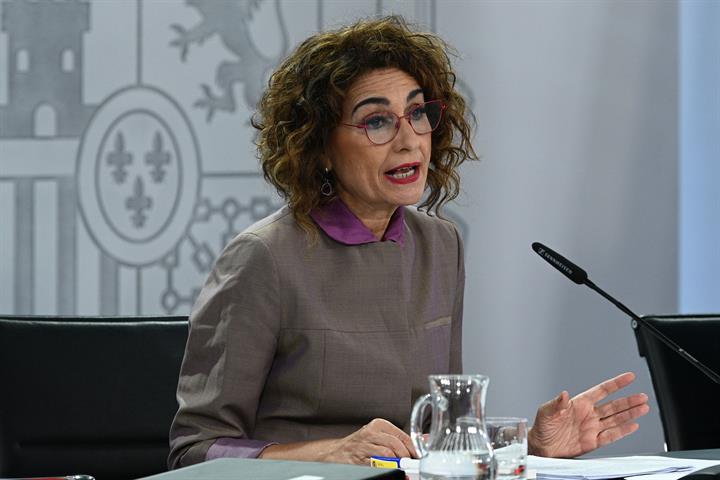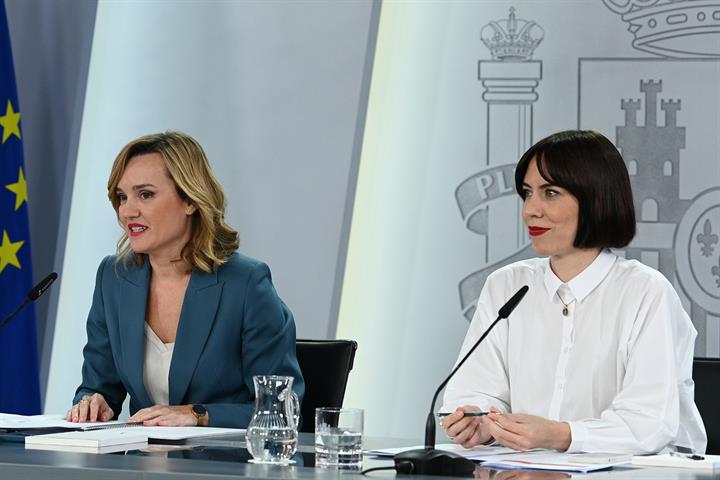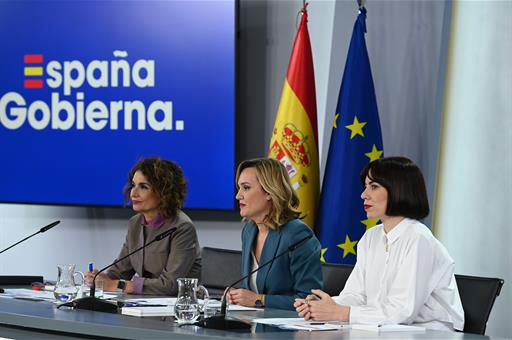The Government of Spain approves the spending ceiling, a key step towards approving the budget in the first quarter of the year
Council of Ministers - 2023.12.12
Moncloa Palace, Madrid
The Council of Ministers has set stability targets and the non-financial expenditure ceiling for general government in the period 2024-2026.
The Fourth Vice-President of the Government and Minister for Treasury and Public Function, María Jesús Montero, has stated that the Government is thus fulfilling its commitment to provide Spain with a new General State Budget as soon as possible. "Hopefully in the first quarter of next year," she said.
Fiscal rigour, modernisation and social policies
The spending ceiling is an essential preliminary step for approving and taking to the Lower House of Parliament accounts which, according to the Fourth Vice-President, will continue along the "path of progress, of modernisation of our country, of support for the productive fabric, but above all of improvement in the quality of life of citizens".
The Minister for Treasury and Public Function has assured that this Executive will be guided, like the previous one, by rigour and prudence in public accounts and by the commitment to fiscal consolidation. "We have shown that the budgets we approve are being met on both the revenue and expenditure sides," she said.
In two years, Spain has reduced its public deficit by more than half, from 10.1% of Gross Domestic Product (GDP) in 2020 to 4.7% in 2022, and it is forecast to close this year at 3.9%. This decrease has been achieved, according to Montero, without implementing policies to cut public services and by deploying an "unprecedented social shield" in response to the COVID pandemic and the war in Ukraine.
Reducing the public deficit
The Fourth Vice-President explained that the general government deficit will stand at 3% of GDP next year, thus complying with the European Union's Stability and Growth Pact. The percentage will fall to 2.7% in 2025 and 2.5% in 2026.
 The Fourth Vice-President of the Government and Minister for Treasury and Public Function, María Jesús Montero, during the press conference after the Council of Ministers | Pool Moncloa/Borja Puig de la Bellacasa
The Fourth Vice-President of the Government and Minister for Treasury and Public Function, María Jesús Montero, during the press conference after the Council of Ministers | Pool Moncloa/Borja Puig de la Bellacasa
Montero pointed out that the EU is debating the fiscal rules and that, if new parameters are not approved, they would revert to those in force before the pandemic. In any case, she said, the Executive's accounts will make it possible to combine the reduction in the deficit required by the rules with growth above the EU average and job creation that represents record highs in terms of the number of people affiliated.
More resources for regional and local administrations
By sub-sector, the target for the autonomous communities for 2024 is reduced by one tenth of a percentage point with respect to the April Stability Plan -from a balanced budget to a 0.1% deficit-, as established in the Fiscal and Financial Policy Council. This increased margin is coupled with an increase in resources from the financing system, which next year will reach a record level: 154.467 billion euros, 14.9% more than this year. In 2025 and 2026, communities will aim for a balanced budget.
The consolidation path for local authorities has also been made more flexible, as agreed yesterday in the National Commission for Local Government. In particular, they will move from a surplus target of 0.2% to a balanced budget by 2024. Local authorities will also have the highest level of resources in history next year: 28.557 billion euros, 22.6% more than this year.
The Minister for Treasury and Public Function has maintained that the greater fiscal margin and the record resources from the financing system will allow these administrations to continue providing quality public services and, above all, to improve the assistance offered to citizens in the areas of health, education and dependency.
For its part, the General State Administration will make greater efforts to reduce the deficit: from 3% in the Stability Plan for 2024 to 2.7% in the new path, which corresponds to the three tenths of a percentage point margin given to the autonomous communities and local councils.
Finally, Social Security remains on the planned path, with a deficit target of 0.2% in 2024, 0.1% in 2025 and balanced budget in 2026.
Realistic spending limit and room for manoeuvre
 María Jesús Montero, Pilar Alegría and Diana Mont during the press conference after the Council of Ministers | Pool Moncloa/Borja Puig de la Bellacasa
María Jesús Montero, Pilar Alegría and Diana Mont during the press conference after the Council of Ministers | Pool Moncloa/Borja Puig de la Bellacasa
The non-financial expenditure ceiling set for 2024 amounts to 199.12 billion euros, 0.5% more than in 2023. Excluding European funds, the ceiling is 189.215 billion, an increase of 9.3%.
"This is a realistic spending limit to continue with these policies to modernise the economy, promoting sustainable, fair and inclusive growth and, of course, strengthening the welfare state," said María Jesús Montero. The Fourth Vice-President added that the government has the margin "to take or extend some of the measures to combat the rise in prices if necessary, a decision that we will take before the end of this month depending on the latest data available, but always with the general interest in mind".
Compliance with the Budgetary Stability Law
The Council of Ministers has also approved a Rebalancing Plan to correct budgetary deviations caused by the exceptional circumstances that led to the suspension of fiscal rules.
The Fourth Vice-President stressed that, with this initiative, which includes the path to reduce the deficit to 3% next year, the Government is complying with the Budgetary Stability Law. A goal, she added, that is achieved not through social cuts, but through economic growth, job creation and the boost of European funds.
"We will not deviate from our objective, we will continue improving the lives of Spaniards, especially the middle and working classes, vulnerable groups, entrepreneurs, SMEs and the self-employed," she concluded.
500 million for university staff training and knowledge transfer
The Government has given a new boost to the science system with two calls for proposals aimed at promoting public-private partnership science projects and improving the training of university teaching staff.
 The Minister for Science, Innovation and Universities, Diana Morant, during her speech at the press conference after the Council of Ministers | Pool Moncloa/Borja Puig de la Bellacasa
The Minister for Science, Innovation and Universities, Diana Morant, during her speech at the press conference after the Council of Ministers | Pool Moncloa/Borja Puig de la Bellacasa
The Minister for Science, Innovation and Universities, Diana Morant, explained that they have a total budget of almost 500 million euros, in addition to the 1 billion euros approved a fortnight ago to finance the scientific research system and other calls to attract talent.
Morant stressed that the funding comes from the national budget and not from the Recovery, Transformation and Resilience Plan. "It has been the will of this progressive government to help bring about improvements for scientists", whose work has a positive impact on people's lives, she said.
Aid for public-private partnership projects
The Council of Ministers has authorised the 2023 call for applications for grants for public-private partnership projects for a maximum total amount of 320 million euros, which may be increased to 360 million euros.
Diana Morant pointed out that the economic amount has been increased by 23% compared to the previous call for applications. This year's grants go to research centres and loans for companies.
The aid for companies, the minister indicated, provides incentives for the incorporation and hiring of doctoral research personnel on an indefinite basis. "The aspiration we have as a country is to increase the presence of researchers in companies," she remarked. In the two previous calls, 313 doctors from our country joined companies.
This call finances experimental development projects in partnerships between companies and research organisations, with the aim of promoting the development of technologies, applying new ideas and techniques to companies, and contributing to the creation of new products and services.
"Knowledge transfer has to be the bridge between the world of research and the world of innovation," said the minister.
Grants for university teacher training
The Government has also authorised the call for grants for university teacher training. for the year 2023 (FPU2023) with a budget of 120 million euros, which can be increased to 134 million euros.
 The Minister for Education, Vocational Training and Sports, and Government Spokesperson, Pilar Alegría, and the Minister for Science, Innovation and Universities, Diana Morant, during the press conference after the Council of Ministers | Pool Moncloa/Borja Puig de la Bellacasa
The Minister for Education, Vocational Training and Sports, and Government Spokesperson, Pilar Alegría, and the Minister for Science, Innovation and Universities, Diana Morant, during the press conference after the Council of Ministers | Pool Moncloa/Borja Puig de la Bellacasa
Diana Morant highlighted that this year's call for proposals represents an 18% budget increase compared to last year and a 68% increase compared to 2018. This allocation will enable 950 contracts to be made and the beneficiaries' salaries to be increased by 15%. "It is just as important to provide opportunities as it is to ensure that they are well paid, and one of this government's priorities is to fight against precariousness in the world of science and universities," she said.
The grants will be awarded on a competitive basis and have a maximum duration of four years. Their aim is to provide research training in doctoral programmes leading to a doctoral degree and the acquisition of university teaching skills in any area of scientific knowledge that will facilitate the future incorporation of the beneficiaries into the Spanish higher education and scientific research system.
Stabilisation of research staff
During her speech, Diana Morant also pointed out that the Official State Gazette yesterday published the appointment of more than 437 tenured scientists in Public Research Bodies, thanks to the public employment offers approved by the Government, the highest number in the last 15 years.
"There is a public science system that meets the public's need for research and that is being met by the government with this budget increase," she concluded.
Digital skills training
The Council of Ministers has agreed to allocate 97 million euros to various not-for-profit organisations to improve digital skills training for children and adolescents between 9 and 17 years of age.
This option combines online and face-to-face training, and the activities will take place during non-school hours and periods, as part of extracurricular activities or during the summer period.
The Minister for Education, Vocational Training and Sports, and Government Spokesperson, Pilar Alegría, has stressed that the measure will benefit more than 400,000 people.
Current Affairs
 The Minister for Education, Vocational Training and Sports, and Government Spokesperson, Pilar Alegría, during her speech at the press conference after the Council of Ministers | Pool Moncloa/Borja Puig de la Bellacasa
The Minister for Education, Vocational Training and Sports, and Government Spokesperson, Pilar Alegría, during her speech at the press conference after the Council of Ministers | Pool Moncloa/Borja Puig de la Bellacasa
During her speech at the press conference following the Council of Ministers, Pilar Alegría described as "magnificent" the agreement reached by the European Union fisheries ministers which includes a 10.5% increase in hake catches for Spain, up to 11,000 tonnes, which is the largest figure this century.
Alegría also expressed Spain's pride at the appointment of the First Vice-President of the Government and Minister for Economy, Trade and Enterprise, Nadia Calviño, as President of the European Investment Bank. "She is the first woman to chair the institution and the first time a Spanish woman has chaired the largest public development bank in the world," she said.
"This election clearly demonstrates the respect and leadership that Spain has today in the international arena and, of course, in the European arena," she added.
Non official translation





